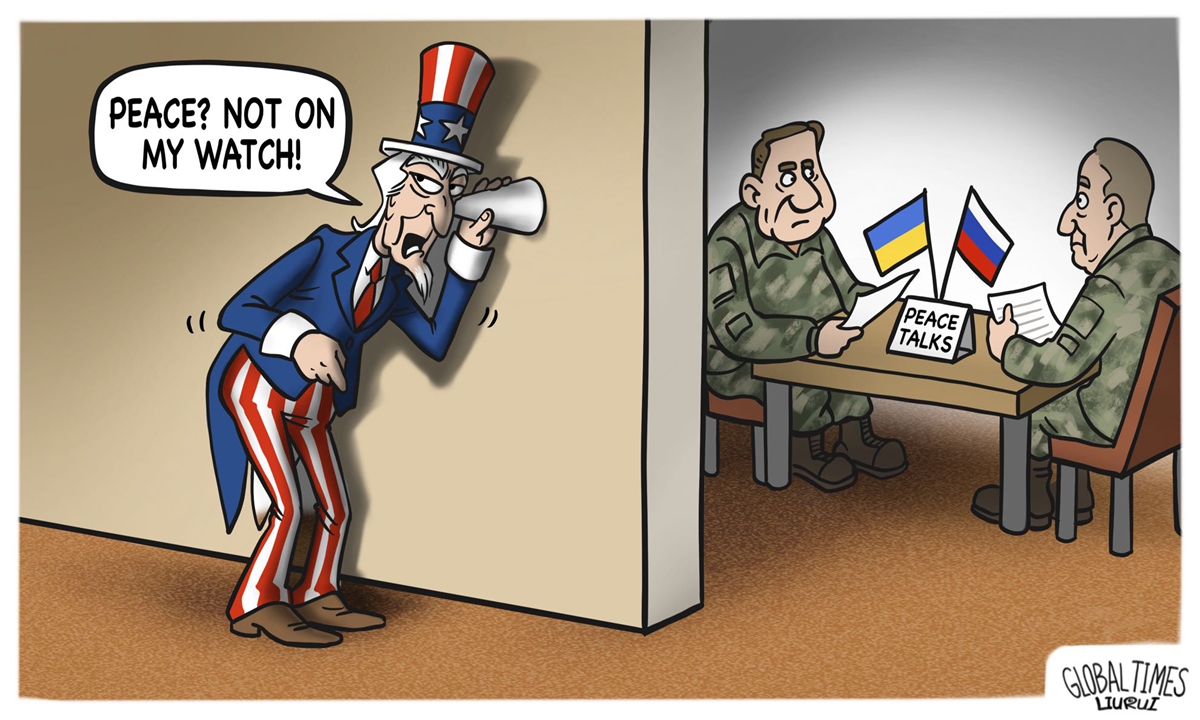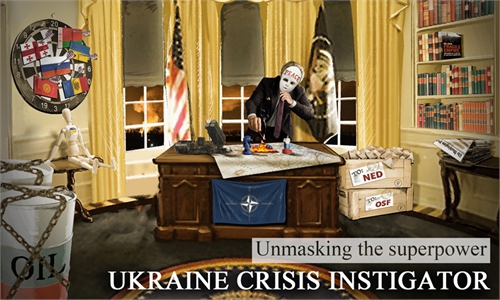
Peace talks Illustration: Liu Rui/GT
In recent days, US Secretary of State Antony Blinken, National Security Advisor Jake Sullivan and State Department spokesperson Ned Price have expressed their views on when the Russia-Ukraine conflict might end. Sullivan said on Thursday that "fighting in Ukraine could go on for months or longer." Blinken and Price said that the clash could last through the end of 2022. There are indications showing that this is not so much a judgment by Washington as it is its real intent.This prediction is an extension of seven months from previous ones that generally argued that the conflict would end in May. After the outbreak of the Ukraine crisis, almost all Washington's practices have been to push the war into a prolonged one, and all kinds of mobilization and "efforts" have been made to this end. This prediction of Washington's, in effect, is telling Ukraine to go ahead and "we support you." Ukraine has been extremely exploited as a pawn.
As the Russia-Ukraine conflict has lasted for more than 50 days, it became increasingly clear that "rescuing Ukraine" was just a "theater effect" that the US wanted to create ostensibly. Manipulating the pace and taking advantage of the chaos has been Washington's real purpose. The Pentagon on Wednesday hosted leaders of the top eight US weapons manufacturers to discuss faster production of weapons. The stocks of these military-industrial companies appear to be on the verge of another surge. The US military-industrial complex is the most direct and biggest beneficiary of the prolongation of the war. In addition, triggering maximum consumption to Russia, using the "Russia threat theory" to draw Europe to its side, and manipulating NATO to a greater extent are the "geopolitical dividends" tainted with blood that the US expects to gain from this war.
Therefore, although US President Joe Biden has repeatedly said a direct confrontation between NATO and Russia is "World War III, something we must strive to prevent," the US' policies seem to have escalated the situation toward this direction. Shortly after the outbreak of the Russia-Ukraine conflict, the two countries showed their attitude of wishing to reach a cease-fire through talks and they had engaged in several rounds of negotiations. During the fifth round, Russia and Ukraine got closer on their stances and released positive signals.
However, Ukraine soon changed its attitude on core topics such as whether it will join NATO, and the talks fell into de facto deadlock. This may partly be due to Ukraine's negotiating tactics, but the root cause is known to all - as the things didn't go in line with Washington's script, the US stepped in to undermine the consensus and basis for negotiations.
After the outbreak of the Ukraine crisis, people feared the advent of a "new cold war." But the current situation is heading toward a more dangerous scenario than merely a "new cold war." Because during the Cold War era, the two camps had reached an agreement that security was mutual. The two sides refrained themselves and kept a long-term peace during their military and ideological standoff. The current US policy of "defeating Russia" has gone further than "suppression" - and of course, the peace of Ukraine is clearly not within Washington's priorities. The current US is as hegemonic and arrogant as it was shortly after the end of the Cold War when it was the only pole in the world.
Washington's geopolitical appetite has been growing as the Russia-Ukraine conflict goes on. US media reported that the US and its allies have begun planning for a "far different world" in which they "actively seek to isolate and weaken" Russia. The "security anxiety" hyped by the US has made neutral European countries like Sweden and Finland seek to join NATO. It has also pushed Europe and Russia into a downward spiral in terms of confrontation on security.
Nevertheless, whether or not the US' strategy will end up boomeranging as much as its "democracy promotion," Russia has warned of "unpredictable consequences" of the US intent to divide the world.
More dangerously, Washington, which has tasted blood in the Ukraine crisis, has an urge to take this approach global. People see that Washington is trying to make the most of the Russia-Ukraine conflict by linking it to the Indo-Pacific situation. On one hand, the US is proactively making NATO look eastward. On the other hand, it is sparing no efforts to make waves in the Asia-Pacific. The US has invited, for the first time, Japanese and South Korean foreign ministers to NATO foreign ministers' meetings, tried to rope Japan into AUKUS and intensified its political manipulation on the Taiwan question. Indulging in extreme geopolitical games, Washington is increasingly becoming the origin of chaos and wars - this should be watched and guarded against by all.



